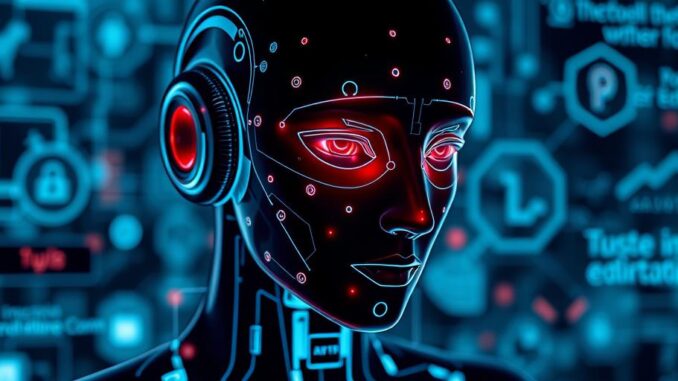
Summary
This article explores the transformative impact of Artificial Intelligence (AI) on healthcare, from diagnostics and treatment to research and administration. We delve into the advancements AI has brought, highlighting its potential to revolutionize patient care and improve health outcomes globally. Finally, we address the challenges and ethical considerations surrounding AI’s integration into healthcare, emphasizing the importance of responsible development and implementation.
** Main Story**
Okay, so AI’s really shaking things up in modern medicine, right? It’s not just some buzzword anymore; it’s actually changing how we diagnose, treat, and even research diseases. The sheer speed and accuracy with which AI can crunch data is just mind-blowing, and it’s impacting patient care in ways we couldn’t have imagined just a few years ago. I mean, it’s already making a real difference worldwide.
AI-Powered Diagnostics: Speed and Accuracy
One of the biggest wins for AI is in diagnostics. Think about it: AI algorithms can analyze those complex medical images – X-rays, MRIs, CT scans – so much faster than a human, assisting doctors in making quicker, and generally, more accurate diagnoses. This is super critical, especially for catching diseases like cancer early, when treatment is usually way more effective. Plus, these AI-powered tools are proving invaluable in areas where access to specialists is limited, bridging that healthcare gap and improving outcomes globally. For example, AI systems now analyse retinal images to detect diabetic retinopathy, a major cause of blindness, even in places where there aren’t many ophthalmologists around. A colleague of mine was recently consulting in rural India, and she told me they were using this exact tech, its incredible!
Personalized Medicine: Made for You
And then there’s personalized medicine. AI’s really paving the way for treatments tailored to each individual. By diving into a patient’s medical history, genetic information, and even real-time health metrics, AI can give us a much more complete picture and predict potential risks. This allows doctors to offer proactive, preventative care and optimize treatment plans for better results. You know, instead of a one-size-fits-all approach. For instance, AI can help us figure out which patients are most likely to benefit from certain cancer therapies, minimizing side effects and maximizing how well the treatment works.
Revolutionizing Research and Drug Discovery
AI isn’t just about treating existing conditions; it’s also speeding up medical research and drug discovery. It can analyze huge datasets to identify potential drug candidates, predict how well they’ll work, and even design personalized drugs. I mean, this dramatically cuts down on the time and money it takes to develop new drugs. AI also helps optimize clinical trials by finding the right patients and predicting potential side effects. This not only speeds things up but also makes the trials safer for patients. Actually, DeepMind’s protein structure database, powered by AI, has already contributed to the development of a malaria vaccine. Who would’ve thought? This shows how much potential AI has for tackling global health issues.
Streamlining Operations: Efficiency and Cost Reduction
It’s not just about direct patient care, either. AI is also streamlining all those administrative tasks, like scheduling appointments, billing, and managing electronic health records. This cuts down on paperwork, improves efficiency, and frees up healthcare professionals to focus on what matters most: taking care of patients. AI-powered chatbots and virtual assistants can provide 24/7 patient support and monitoring, which helps patients stay engaged and stick to their treatment plans. It improves patient satisfaction and takes some of the burden off healthcare staff, especially in primary care. Can you imagine not having to answer the same questions over and over again?
Challenges and Ethics
However, and this is important, while AI offers incredible potential in healthcare, we’ve got to address the ethical considerations and challenges. Data security and patient privacy are absolutely crucial; we need strong measures to protect sensitive information. Algorithmic bias, which can creep in from unrepresentative datasets, needs to be carefully addressed to ensure fair access to care. Also, transparent and accountable AI decision-making is essential to maintain patient trust and address any concerns. Clear regulatory frameworks and guidelines will be key for the responsible development and use of AI in healthcare, don’t you think? I think that continuous monitoring and evaluation are also essential to catch and fix any unintended consequences of AI implementation, making sure that it’s really a force for good. The last thing we want is for this amazing tool to cause harm. Ultimately, AI’s not a replacement for human doctors and nurses, but a powerful tool to help them do their jobs even better.


AI diagnosing faster than humans? So, are we training AI to become super-speedy hypochondriacs, or will it finally figure out what’s *really* wrong when I Google my symptoms? Asking for a friend… who’s a doctor, obviously.
That’s a great point! It’s true that AI diagnostic tools might lead to some interesting (and hopefully not too frequent) misinterpretations, just like when we all self-diagnose using Google. Perhaps AI will eventually guide us away from the worst of those online rabbit holes! What do you think the biggest challenge is in avoiding those pitfalls?
Editor: MedTechNews.Uk
Thank you to our Sponsor Esdebe